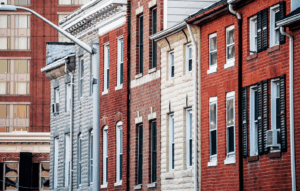By Lauren DiMartino and Alisha Jarwala
 Passed just a week after the assassination of Martin Luther King, Jr., the Fair Housing Act is one of America’s foundational civil rights laws—it bans discrimination in housing based on race, religion, nationality, sex, disability, or family status. The Department of Housing and Urban Development) (“HUD”) and its Office of Fair Housing and Equal Opportunity (“FHEO”) are meant to enforce it. But under the Trump administration, that enforcement is unraveling. Recent whistleblower allegations—combined with Executive Orders and disappearing grants—show not just neglect, but systematic dismantling. Considering Trump’s own past as a discriminatory landlord, no one should be surprised.
Passed just a week after the assassination of Martin Luther King, Jr., the Fair Housing Act is one of America’s foundational civil rights laws—it bans discrimination in housing based on race, religion, nationality, sex, disability, or family status. The Department of Housing and Urban Development) (“HUD”) and its Office of Fair Housing and Equal Opportunity (“FHEO”) are meant to enforce it. But under the Trump administration, that enforcement is unraveling. Recent whistleblower allegations—combined with Executive Orders and disappearing grants—show not just neglect, but systematic dismantling. Considering Trump’s own past as a discriminatory landlord, no one should be surprised.
A Troubling Legacy: Trump as Landlord
Long before his political career, Donald Trump and his family real estate business were sued by the U.S. Department of Justice for housing discrimination. In 1973, DOJ’s Civil Rights Division filed United States v. Fred C. Trump, Donald Trump, and Trump Management, Inc., alleging that the Trump organization systematically discriminated against Black renters in many apartment complexes in New York City, steering them away from certain buildings or concealing vacancies. Specifically, Black and white “testers” found that white applicants were told about vacancies while Black applicants were told nothing or directed elsewhere. In addition, internal codes or markings were allegedly used to flag Black applicants. The case settled after two years with a far-ranging consent decree—while it included standard settlement language that it was “in no way an admission” that the Trumps violated the law, it also prohibited discriminatory practices, required the Trumps to familiarize themselves with the Fair Housing Act, and required them to take affirmative steps to advertise vacancies to potential Black renters.
Trump’s legacy of discrimination and illegal landlord practices extends through his family connections, including his son-in-law, Jared Kushner. In 2024, Brown, Goldstein & Levy won a Supreme Court of Maryland case prohibiting Baltimore-area apartment management company Westminster Management from charging tenants excessive late fees. Westminster is co-owned by Kushner and has also faced scrutiny for evicting tenants during the COVID-19 pandemic during the eviction moratorium.
Trump’s legacy casts a long shadow when the same person is now presiding over the very enforcement machinery meant to guard against the abuses of landlords.
Enforcement in Trump’s First Term: Weakening Tools
During Trump’s first term, enforcement under HUD was already under pressure: the 2015 Affirmatively Furthering Fair Housing (AFFH) rule was suspended and later replaced by a weaker version; HUD rescinded or weakened guidance around protections for people with disabilities and survivors of domestic violence; and Trump’s budget plans frequently proposed deep cuts to HUD programs and fair housing enforcement, though many cuts were blocked or mitigated by Congress. The effect: enforcement slowed, and many policy tools were scaled back. But the institutional capacity of HUD’s fair housing offices remained largely intact.
Now: Whistleblowers Sound the Alarm
What’s happening in the current Trump term is qualitatively more alarming. Four civil-rights attorneys (and other HUD staff) have come forward to alert the public that HUD’s fair housing enforcement is being actively dismantled. Highlights (or lowlights) of the report include:
- Staffing cuts of nearly 70%: The Office of Fair Housing (“OFH”) began the year with approximately 31 staffers; the plan is to leave only approximately 11, with only six attorneys.
- Gag orders on attorneys: OFH attorneys—traditionally a non-partisan group—are prohibited from communicating with complainants, DOJ, or other government bodies without express approval from political leadership.
- Case closures and dropped investigations: More than 115 housing discrimination cases have been reportedly closed or halted improperly. Some referrals to DOJ have been rescinded.
- Political interference over career staff decisions: Political appointees are overriding factual findings, withdrawing settlements, and preventing cases from moving forward even where discrimination had been found.
- Abandoning vulnerable populations: The whistleblower report states that teams handling cases for domestic violence survivors, accessible housing for people with disabilities, and other protected groups have been dismantled.
- Frozen or canceled grants: Grants to nonprofits under the Fair Housing Initiatives Program (“FHIP”) were abruptly terminated; other pending applications have been frozen. Nonprofits have long been the frontline for testing, intake, education, and litigation. They can recruit “paired testers” (applicants with matched credentials but different protected statuses) to uncover discrimination. With grants being cut, this work has become more precarious and there are less resources available to people facing housing discrimination.
The whistleblowers argue this is not benign neglect: it’s a deliberate strategy to dismantle HUD’s civil rights capacity. HUD leadership reportedly told staff that fair housing is “not a priority” and that the enforcement office had become an “optics problem.” This is presumably because of the President’s executive orders vaguely declaring that anything that protects the rights of people of color as “illegal DEI.”
In short: HUD has gone from enforcing the Fair Housing Act to actively obstructing. The whistleblowers allege that the agency is closing valid cases, blocking investigations, and preventing action even when discrimination is proven.
What Now?
All is not lost. Even as federal enforcement retreats, other actors can help fill the gap.
State & Local Enforcement
Many states, cities, and counties have their own fair housing or human rights laws — often broader than federal law. Those agencies can accept complaints, investigate, issue penalties, and bring lawsuits.
Some places, like Maryland, require complainants who first file their complaints with the state civil rights agency to wait for a designated period of time before filing in court. In Maryland, people who file their complaints with the Maryland Commission on Civil Rights (“MCCR”) must wait 130 days, or until MCCR reaches a resolution, before filing in court. Given the anticipated rise in state filings, those jurisdictions should consider doing away with that requirement so that private attorneys can help serve as “private attorneys general” and step in to investigate and litigate some of these claims.
Private Right of Action
Individuals who believe they’ve been discriminated also have a private right of action—meaning they don’t have to wait for a government agency to act on their behalf. They have the option to work with private attorneys to sue under the Fair Housing Act in federal court, seeking monetary damages, injunctive relief, and attorneys’ fees. They may also be able to sue under local or state fair housing laws, which often have stronger remedies or lower burdens of proof. Attorneys can also file amicus briefs in cases on appeal. Further, because of the Executive Order preventing federal agencies from taking on cases involving disparate impact, private attorneys can still address those cases in the court—the Executive Order does not do away with decades of legal precedent that remains accessible and useful for bringing cases that involve subtle, systemic forms of discrimination that may not involve overt animus but still produce discriminatory outcomes.
Strategic Partnerships & Hybrid Approaches
Local agencies, nonprofits, and private lawyers can collaborate: for example, local governments can refer cases to nonprofits or law firms; nonprofits can bring systemic complaints and hand off individual cases to individual private lawyers. State Attorneys General may even intervene to support a particular argument or case, lending the weight of state enforcement power to theories that support and enhance fair housing protections. Public awareness campaigns and “name and shame” strategies can pressure localities, landlords, and lenders to comply even without federal enforcement.
Why It Matters
When discrimination is left unchecked:
- Segregation deepens, and marginalized communities remain isolated from opportunity
- Housing costs higher-opportunity areas stay out of reach
- Access to quality schools, transit, employment, health care, and services becomes increasingly unequal
The Fair Housing Act was never a nominal law to be ignored—it was intended to provide real protections and is often considered one of the most impactful civil rights laws of the 20th century. If those protections are gutted at the federal level, much of the burden shifts downward—to states, cities, nonprofits, and private attorneys. Those actors can’t fully replace HUD’s muscle, reach, and authority. The loss of federal capacity risks allowing landlords like Donald Trump and to operate with impunity while simultaneously overseeing the very agency meant to hold them accountable.
The Path Forward
The irony is stark: a president with a documented history of housing discrimination now oversees the gutting of the agency responsible for fair housing enforcement. But history also teaches us that civil rights progress has never depended solely on federal action. The civil rights movement succeeded through a multi-pronged strategy: litigation, legislation, grassroots organizing, and public pressure.
Today’s advocates must adopt a similar approach. State and local governments must strengthen fair housing infrastructure. Private attorneys must step up to fill the enforcement gap. Nonprofits and community organizations must continue their crucial testing and education work, finding new funding sources where federal grants have disappeared. And the public must remain vigilant, demanding accountability from landlords, lenders, and local officials.
The fox may guard the henhouse for now, but the fight for fair housing continues—in state courts, city halls, and communities across the country. The question is not whether we can survive this federal retreat, but whether we can emerge with a more resilient, decentralized enforcement network that does not depend on any single administration’s commitment to housing justice.
If you believe you or someone you know has experienced housing discrimination, please contact us today.

